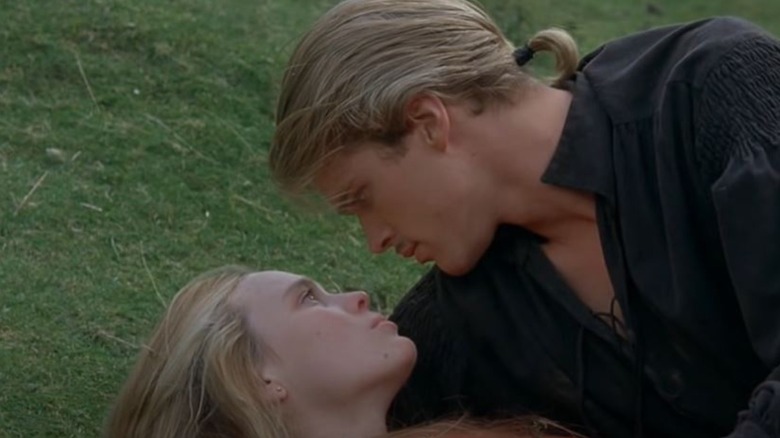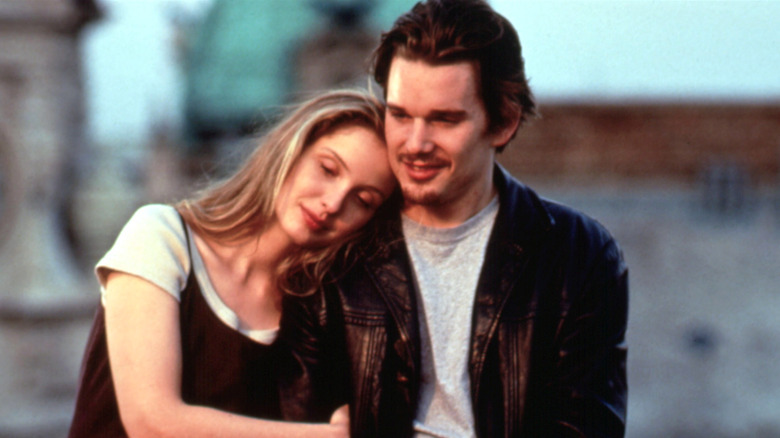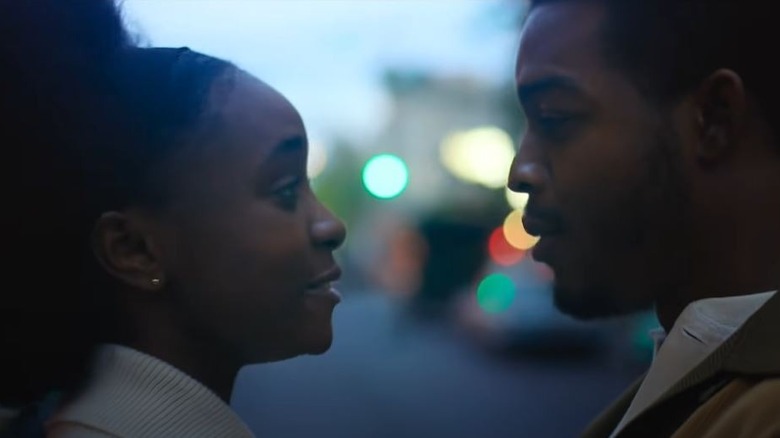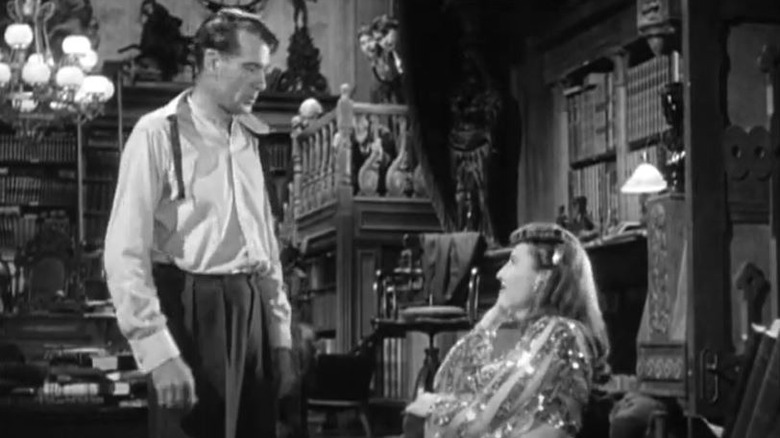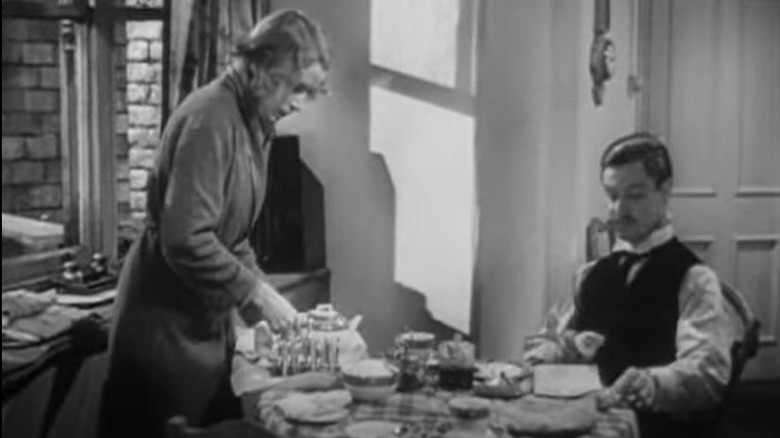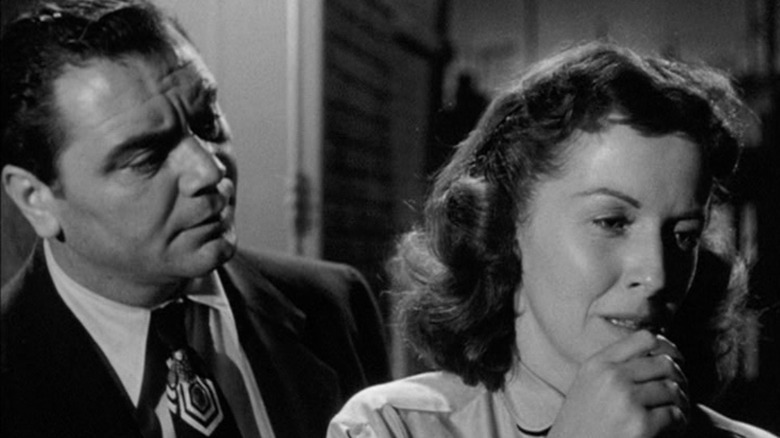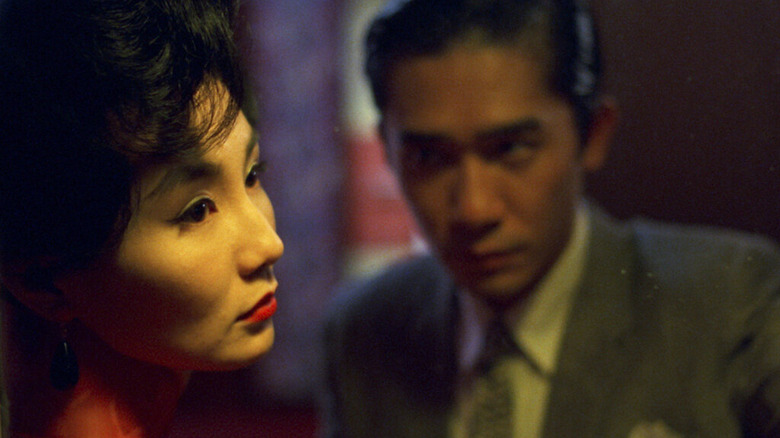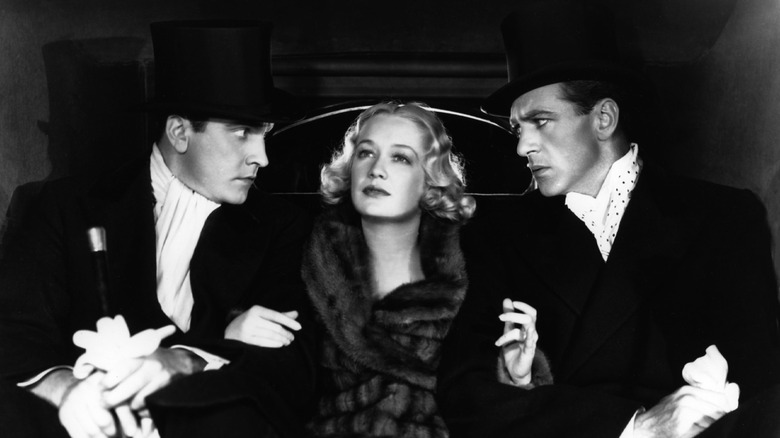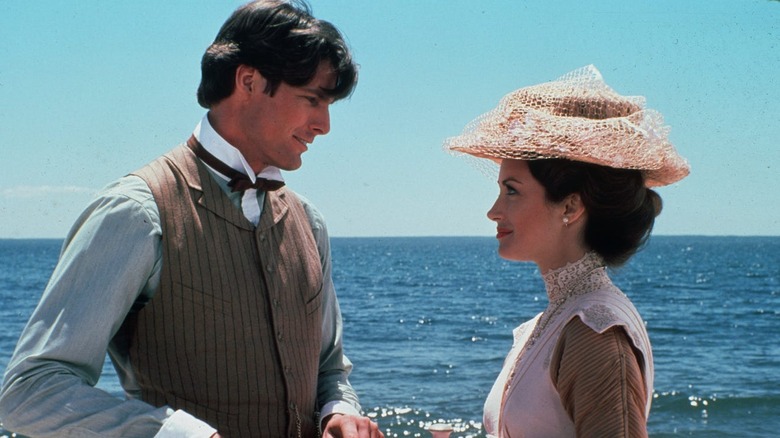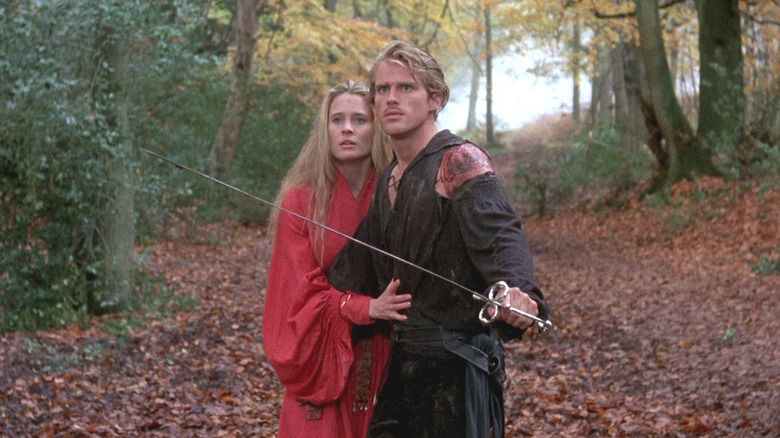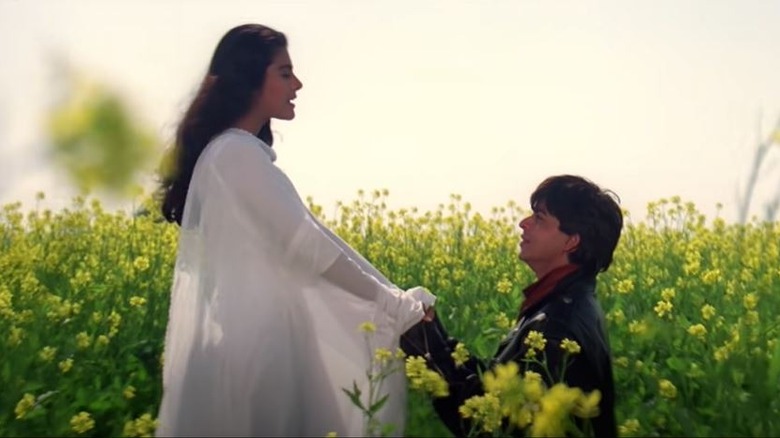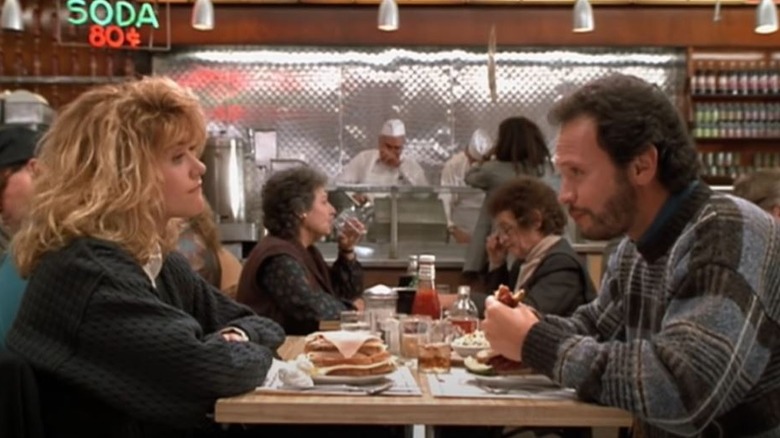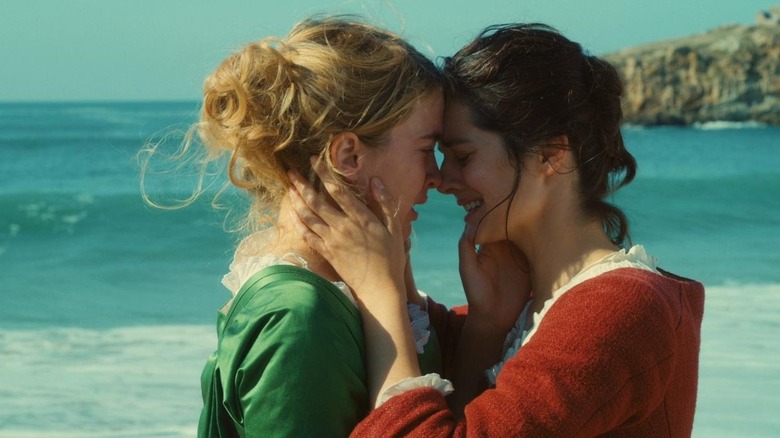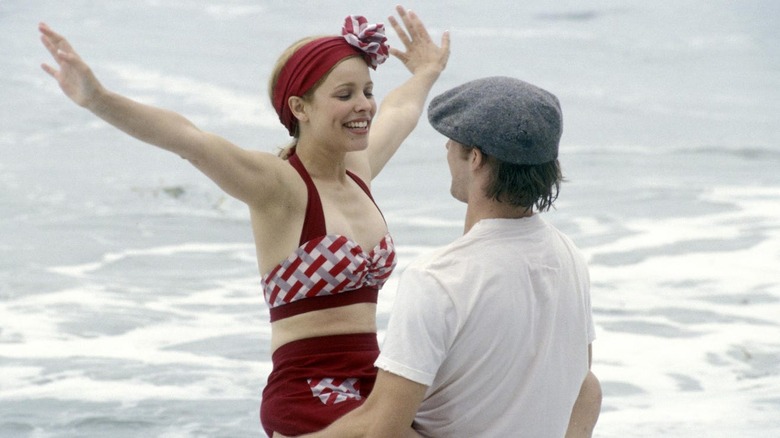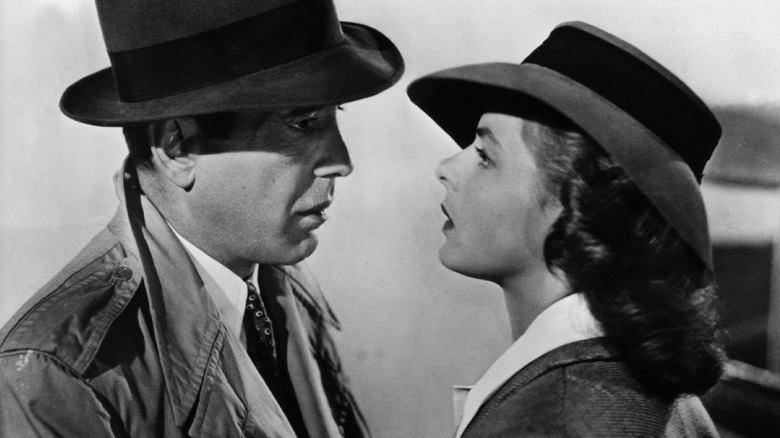14 Greatest Romance Films Of All Time
Romance is at the heart of almost every Hollywood film. It's difficult to find a major Hollywood film that doesn't have a love story as either the main storyline, or at least a minor subplot. So why is it that films that focus primarily on their romantic elements are so often framed as less serious, less legitimate cinematic efforts? It's a reflection of a society that judges things that women like as frivolous and things that men like as art, where romance pictures are derisively called "chick flicks."
Still, not every romance film is made equal, and, just like every other genre in Hollywood, they vary significantly in terms of quality. At their worst, they're lazy and formulaic, barely mustering up enough effort to build a compelling meet-cute between their two leads. But at their best, like the films on this list, they capture something emotionally evocative about the human condition, that we are not built just to eat and drink and sleep, but to love.
14. Before Sunrise
Whatever people thought Richard Linklater was going to do to follow up his first two indie hits, "Slackers" and "Dazed and Confused," they certainly got a surprise when his next film was the quiet, understated European romance "Before Sunrise." It stars Ethan Hawke and Julie Delpy as two strangers who meet on a train to Vienna, and have an immediate spark. They spend the ride engaging in deep conversation, and spend the night together once they reach Vienna — the entire time knowing that once their rendezvous is over, they will return to their separate lives and likely never see each other again.
There's an authenticity to "Before Sunrise" that makes it incredibly compelling, and the romance is no less engaging for having a strictly enforced termination point. (How strict is up for debate: the film proved so successful that Linklater and his stars would reunite for two sequels, "Before Sunset" and "Before Midnight.")
13. If Beale Street Could Talk
It's easy enough to make a movie that features a sweet love story, but with "If Beale Street Could Talk," Barry Jenkins created one that drips romance from every pore. From the gorgeous, moody lighting to the smooth, evocative, string-filled score by Nicholas Britell, all elements of the film work together to capture the power and energy of the love between Tish (KiKi Layne) and Fonny (Stephan James).
Based on a novel by James Baldwin, "If Beale Street Could Talk" explores the relationship of childhood friends-turned-lovers in 1970s Harlem, and their efforts to fight a charge that will see Fonny sent to jail for a crime that he didn't commit. Their unwavering devotion to one another sees them through hardship after hardship, and is echoed by the powerful support for the couple from Tish's mother Sharon, a performance for which Regina King won Best Supporting Actress at the Academy Awards.
12. Ball of Fire
Director Howard Hawks has plenty of screwball romantic comedies under his belt, but "Ball of Fire" is undoubtedly one of his most underrated. It stars Gary Cooper playing extremely against type as a reserved, bookish grammarian who is working with a team of older bachelor intellectuals to develop a new encyclopedia — an endeavor he must remain so devoted to that he can't entertain the possibility of romantic entanglements. But one day, while he's out trying to get some real world experience with modern slang, he meets Sugarpuss (Barbara Stanwyck), a nightclub singer on the run who ends up moving into their mansion and disrupting their carefully arranged lives.
Stanwyck has rarely been better than she is here, bright and alive and empowered, playing neither a dumb broad or a sexy stunner, but a shrewd young woman who knows what it takes to survive. Their relationship is unbelievably precious, with Stanwyck taking the lead opposite an incredibly inexperienced Cooper (hilariously so, considering that Gary Cooper was not just the premier heartthrob of his day, but also had a reputation for bedding a not insignificant number of his leading ladies).
11. Vacation from Marriage
War romances are often centered around two main concepts: the loving and devoted couple cruelly separated by the war, with the husband heroically fighting so that he might have a chance to see his beloved again; and the couple who see their relationship crumble as they are kept apart, with either or both finding solace in the arms of another. "Vacation from Marriage" (or, as it was called during its initial UK release, "Perfect Strangers") somehow manages to be both.
Robert Donat and Deborah Kerr play a bit of a fuddy duddy couple from London. He is a mild-mannered office drone who can't work up the nerve to ask for a richly deserved raise, she a dowdy housewife with a persistent cold. But then the war comes, and changes everything. They both enlist to support their country, and find to some great surprise that they feel far more emotionally fulfilled in service than they ever did at home. "Vacation from Marriage" addresses the very real gulf created by war between two people who are unquestionably altered by their experiences (something many couples would have been dealing with when this film came out in 1945) and the question of how they can ever move forward when they barely recognize one another anymore.
10. Marty
Ernest Borgnine as a romantic lead? Sounds crazy, but it works so much better than you'd think. He stars in "Marty" as a somewhat shy Italian-American butcher with low self-esteem. He also faces an ungodly amount of pressure from relatives who want to know why he's in his thirties and hasn't settled down with a nice girl yet. Enter Betsy Blair as Clara Snyder, a sweet but introverted schoolteacher who has also struggled to find a romantic partner, since men seem to frequently leave her in the lurch whenever a prettier option comes along.
They meet at a dance, and both parties have such a pleasant time that they keep finding excuses to keep the night going. "Marty" is one of the rare films, even fifty years later, about a romance between two people who don't necessarily have movie star looks. (Although Betsy Blair's status as an ugly duckling is a little suspect: she was married to Gene Kelly, after all!)
9. In the Mood for Love
Borne out of betrayal and ending in loneliness, "In the Mood for Love" does not perhaps follow the obvious strictures of a Hollywood love story. Maggie Cheung and Tony Leung star as neighbors who discover that their respective partners are having an affair with one another. Initially, they merely commiserate with one another. But before long, they begin to develop feelings for each other, feelings that they struggle to act upon.
Outwardly reserved but with simmering passion beneath the surface, "In the Mood for Love" is a moody, powerful exploration of romance never allowed to blossom. Although their grand love story is left unconsummated, we are never left in doubt of the depth of their emotions, allowing director Wong Kar-wai to build a tale as beautiful as it is melancholic and bittersweet. "In the Mood for Love" is not just a hallmark of Asian cinema: it also influenced a generation of Hollywood filmmakers, with Sofia Coppola in particular noting its influence on "Lost in Translation."
8. Design for Living
Shocking both for its day and now, "Design for Living" is perhaps the first romantic comedy that clearly depicts the interpersonal dynamics of a throuple (that is to say, a three-person romantic relationship.) Fredric March and Gary Cooper play two American friends and roommates living in Paris who meet the beautiful Gilda (Miriam Hopkins) while on a train. They strike up a friendship with her, both competing for her affections.
But while she dates one, then the other, it's clear that she has no interest in choosing between the two of them. So rather than be parted from her and have their own relationship destroyed (one that has more overt homosexual tones in the original play by Noël Coward, but is still present in the film), they agree to an unconventional but ultimately fulfilling ménage-a-trois scenario. Controversial upon its original release, "Design for Living" is a daring romance that sneaks in just under the wire before the Production Code would begin coming down on films for their overtly sexual content.
7. Somewhere In Time
Have you ever seen a more unfairly beautiful couple than Christopher Reeve and Jane Seymour? Seriously, it makes sense that their love would defy the laws of time and space: the universe just needs these two together. Christopher Reeve plays a writer on a vacation at a lakeside resort, desperate for inspiration. But when he sees a portrait of an actress from the turn of the century, he is driven to distraction, enthralled with her beauty.
He's so obsessed that he finds a way to travel back in time through self-hypnosis for a chance at a glimpse of her in the flesh. Their romance is hazy and atmospheric, almost as though it was merely part of a dream. But like any dream, it can't last forever. Still, their brief moment of connection is incredibly powerful, so much so that it lingers through eternity until they are reunited in the great beyond.
6. The Princess Bride
"The Princess Bride" was created to emulate a classic fairy tale (even though William Goldman didn't write the novel it was based on until 1973), so it's unsurprising that it would feature one of the most iconic fantasy romances. It really has everything people are looking for in a great love story. Two incredibly attractive individuals have a romance that transcends both class (Buttercup is a princess, while Westley is but a humble farmboy) and death (when Westley leaves to earn his fortune, his ship is attacked by the Dread Pirate Roberts and he is presumed dead for many years).
They are charming, entirely devoted to one another, and have perhaps the single greatest three-word declaration of love in cinematic history: "As you wish." The relentlessness with which Westley pursues Buttercup once she is recaptured by her murderous fiancé Prince Humperdinck is a testament to how deeply he cares for her. And while he is initially stung by the idea that she has abandoned his memory with her engagement to the prince, their reconciliation is swift (and accompanied by a swift fall down a steep hill), There aren't a lot of men who would take a bite from a Rodent of Unusual Size for you, so you've got to adore the ones who will.
5. Dilwale Dulhania Le Jayenge
It's almost impossible to put into words the impact that "Dilwale Dulhania Le Jayenge" had on Indian audiences when it was first released. It came out in 1995, and as of 2021, is still running in theaters in India, making it a contender for the longest continuously playing film in history. "Dilwale Dulhania Le Jayenge” would make stars out of its two lead actors, Shah Rukh Khan and Kajol, who played an unlikely romantic pairing in one of the ultimate enemies-to-lovers arcs.
Khan plays Raj, a wealthy, happy-go-lucky young man raised by an indulgent father, while Kajol is Simran, a far more practical daughter of conservative parents who is initially unimpressed by his charms. Both have grown up in London, but, before settling down (Simran into an arranged marriage, and Raj into a business career) they both embark on separate European tours that will inadvertently throw them into each other's path. Their chemistry is undeniable, and the snow-capped mountains of Switzerland provide a perfect backdrop for their romance to unfold. With humor and classic Bollywood musical numbers, "Dilwale Dulhania Le Jeyenge" and its two stars earn every inch of their record-breaking success.
4. When Harry Met Sally
How often do we get romance films where there's love at first sight — a couple see each other across a crowded room and immediately know that they're meant for one another? Or where the couple in question actually begin by hating each other's guts, only for their feelings to evolve into something more complicated once their personalities are more revealed? "When Harry Met Sally" is refreshing because it's neither of these two extremes: it simply posits the idea that men and women can be friends with each other and have their relationship slowly grow into something romantic over time. Harry (Billy Crystal) and Sally (Meg Ryan) meet while on a cross-country road trip to New York City after college. They find each other slightly annoying, but split amicably, meeting a handful of times over the years before beginning a close friendship.
They're emotionally intimate, but their love lives never seem to line up — when one is romantically available, the other is in a relationship. They have such an easy chemistry with one another that the love that grows between them is entirely organic. And also, "When Harry Met Sally" features perhaps the most legendary side couple in cinematic history: Bruno Kirby and Carrie Fisher as the friends of Harry and Sally who fall in love on their own.
3. Portrait of a Lady on Fire
The single greatest thing about "Portrait of a Lady on Fire" is its depiction of the unique love between two women. In fact, it stands out because of how distinctly feminine it is — something you don't even notice until a guy shows up for one scene, and you realize that for the past hour or so, you've just been watching women vibing in the complete absence of men.
Marianne is a painter, who has been hired to befriend Héloïse, reluctant to sit for a portrait that will be sent to her future husband, and surreptitiously take her likeness. Instead, they form an intimate bond with one another, making their inevitable separation all the more devastating. Aside from the romance, which is artfully done and deeply felt, "Portrait of a Lady on Fire" captures the terror of being betrothed to a man you have never met, especially after being raised in a convent and surrounded by women your entire life, and the powerlessness of having your fate decided for you.
It's a film that only a woman could make this beautifully resonant, and Celine Sciamma cements her reputation as one of the leading directors of modern French cinema with her work here.
2. The Notebook
We're Nnt sure why romantic films often have to be really, really sad, but "The Notebook" is definitely one you should only be prepared to watch if you have a minimum of three full boxes of tissues next to you. The tears will fall. Ryan Gosling stars as Noah, a handsome young man infatuated with the upper-class Allie (Rachel McAdams) in the 1940s. They have an on-again, off-again relationship that involves fights, failed engagements, and the renovation of one seriously gorgeous manor house (yeah, okay, it's a former plantation, but you can't have everything),
And this is sweet and all, but the real tragedy is in the framing story of an old man reading this romantic story to, it turns out, the elderly version of Allie, who now has dementia and has forgotten all about her epic love with Noah. Also, not for nothing, but "The Notebook" was directed by Nick Cassavetes, son of legendary filmmaker John Cassavetes, and he cast his own mother, Gena Rowlands, in the role of the older version of Allie — which is, you know, just another thing to make you cry.
1. Casablanca
In many films, the trope of the love triangle can become tiresome — mostly because there's usually a clear winner amongst the suitors, and we're all just biding our time until the protagonist finally makes the obvious decision. But one of the many reason why "Casablanca" is such a great romance is that you really can't tell which way Ilsa (Ingrid Bergman) is going to go. On the one hand, you have Victor Laszlo (Paul Henreid): Ilsa's husband, a freedom fighter and member of the Czech resistance for whom Ilsa has tremendous warmth and overwhelming admiration. When he leads the band at Rick's Cafe Americain in a rousing chorus of La Marseillaise, the look on her face as she gazes at him is one of deep and solemn love.
Then you have Rick himself, the reluctant hero played by Humphrey Bogart in what is maybe his best performance. Rick is a self-avowed neutral party, shouting from the rooftops that he's just trying to run a business. Empty words: both his established partisan past and his actions within the film betray his principles. The relationship between Rick and Ilsa is lustful in a way that was undoubtedly a matter of concern for the censorship office. Their connection is powerful, so much so that "Casablanca" has remained a romantic cinematic icon for nearly eighty years.
